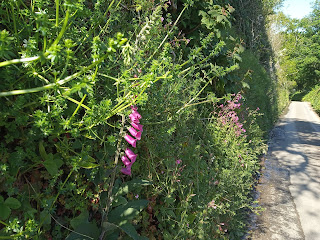Next week will mark a year since I came to the UK for a short visit and ended up staying for a 'bit' longer than expected. For most of us it's been a strange year - with unexpected changes and limitations. Apart from the concern for health, this year has also striped us of much sense of being able to plan for the future, or have control over our lives.
Last Sunday, I was privileged to be able to share (virtually) with my local church about Joseph's life of faith. He was also someone who was robbed of his capacity to plan for the future, when he was sold as a slave. He was able to mature, be faithful to God and use the gifts he had been given in several twists and turns in his life. Yet he came to the end of his life, and asked his family to take his body back to the land that had been given to his great grandfather. He knew that God had been faithful in the detour of his life, but that there was a greater promise that he was a part of.
I shared the modern(ish) example of Joni Mitchell. Best known as a singer songwriter from the 60's she sees herself as a painter, who was derailed by circumstance. Her songs expressed an angst and disappointment that she couldn't fully articulate in everyday life. But once the circumstance that had derailed her passion for painting was resolved and came full circle, she stopped writing songs and returned to painting.
Many of us have put things on hold this last year, or have felt derailed or detoured by the pandemic. But there are passions and dreams that we hold which will come back to the fore.
We try to plan for the future, but are frustrated with the niggling feeling that perhaps we can't control the future (*spoiler - we can't!). So I tried to learn a trick or two from the Andean worldview. The Quechua and Aymara groups in the Andes visualise the past in front of them (as opposed to behind us like the western culture), because they know what happened in the past, they can see it clearly as if it's in front of their eyes. They visualise the future as behind them - because they can't see it, and they don't know how it will develop. So they talk of walking backwards into the future.
In preparation for Sunday, I practiced walking backwards. I might have got a few strange looks whilst I was on my daily walks, but here's what I learnt!
Walking backwards means that I take every step with a bit more care and attention, and go slower! That's not a bad thing.
Walking backwards uphill (I live in Devon!) can actually be much easier and a lot more enjoyable than walking forwards uphill. The big difference is that I can see where I've come from, and how much progress I have made already.
The practice of remembering where they've come from and what God has done in the past is a key component of the Israelites walk of faith in the Old Testament. There are several times when they set up stones of remembrance to help them remember God's presence with them in specific moments so that they could walk into the unknown future with the assurance of his faithfulness with them.
So what are the stones of remembrance in your life?
It also made me think of reversing a car. Some of us are better at it than others, but for most of us, we need a bit more concentration and caution when we reverse, compared to driving forwards. We might get a snapshot of what's behind us in the wing mirror, but it doesn't give us the complete picture. What's even more helpful when we try to reverse, is having a friend who can see everything that's behind us, and can give us some simple instructions to follow. We actually don't need to see the whole picture, we just need to trust the one who does.
So as we begin to move out of lockdown (again), I'm trying to put into practice these principles - in the absence of certainty for the future, I keep my eyes on the certainty of God's faithfulness in the past. And as I can't see a full picture of where I am going, I'm trusting God, who can, and learning to hear his voice as he instructs me in the way I should go.
How are you preparing to come out of lockdown?





















































